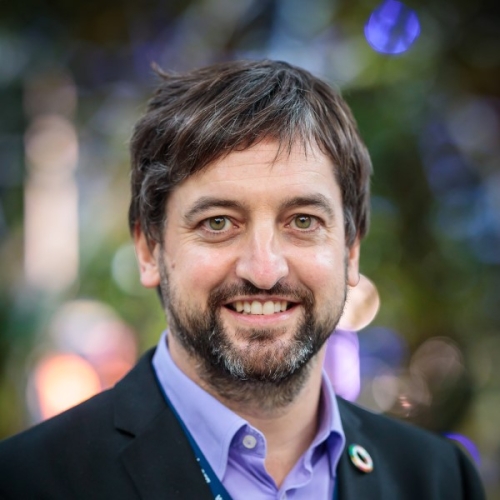Champions of change fighting for sustainable development
Now that COVID-19 hits the world, it is becoming more apparent than ever how vital it is to have access to technological solutions for fighting health emergencies. And while this brings a new sense of urgency to innovation efforts, the COVID-19 crisis also reveals the power of inspiring leadership.

Champions of change make the difference
Vision, decisiveness and empathy are the qualities that single out inspiring leaders. Such leaders are true champions of change that can move people into adapting their behaviour and save them from the worst of the COVID-19 storm.
Champions of change make the difference in times of crisis. They will therefore be crucially important to fight the tsunami of climate change challenges ahead of us. During the G-STIC conference of 2019 , we had the privilege of welcoming several champions of change from all sectors of society. Gro Harlem Brundtland, Damilola Ogunbiyi and Hindou Oumarou Ibrahim are among the ones that will inspire our G-STIC community at the G-STIC Conference of 2020.
Gro Harlem Brundtland, a sustainable development pioneer
In 1974, the then Norwegian Prime Minister asked Gro Harlem Brundtland (trained as a doctor) to enter the government as environment minister. It only took her a day “to realise environmental policies are public health policies for people at large. It’s the same thing. We don’t take care of nature only because we love birds, but we do it because it’s best for humanity.”
Already at the age of 35, Gro Harlem Brundtland proved to be a champion of change and an SDG visionary. It shouldn’t therefore be a surprise that the UN Secretary-General invited her in 1983 to chair the World Commission on Environment and Development (WCED). The WCED was given four years to come up with an integrated solution to address global environmental problems, poverty in developing countries as well as the ongoing economic crisis.
Against the expectations of many, the Brundtland Commission succeeded in its seemingly impossible task. The “Our Common Future” report, published in 1987, stated that poverty could be combated with economic growth that is not at the expense of the environment if the world transitions to sustainable development. This report provided the momentum for the United Nations Conference on Environment and Development (UNCED) in 1992, also known as the “Earth Summit”, for Agenda 21 and ultimately for the Sustainable Development Goals. Gro Harlem Brundtland is unquestionably a sustainable development pioneer, and we’re proud she is part of the G-STIC community.
Damilola Ogunbiyi, a champion in closing energy access gaps
“Energy is central to nearly every major challenge and opportunity the world faces today”, Damilola Ogunbiyi says. And she says that with good reason. Throughout her career, she has witnessed like no other the transformative effect of bringing energy to people. Energy access gives children a chance for much better education and enables their parents to build prosperous, fulfilling lives. Since January 2020, Nigeria-born Damilola Ogunbiyi is CEO and Special Representative of the UN Secretary-General for Sustainable Energy for All (SEforALL) and Co-Chair of UN-Energy.
In a recent article published by the World Economic Forum, this passionate champion of change highlights how crucial energy access is in tackling the COVID-19 pandemic and catalysing economic recovery. Lack of reliable access to energy may make it impossible for hospitals and first-line medical services to treat critical patients, magnifying the human catastrophe and slowing down the global recovery.
Access to energy saves lives. It’s as simple as that. Solutions are available, and if we do not seize them during this COVID-19 crisis, when will we? Under Damilola Ogunbiyi’s guidance, SEforALL has therefore resolutely adjusted existing programmes and launched new initiatives to address the power needs of health facilities and to support off-grid renewable power solutions.
Hindou Oumarou Ibrahim, one of 17 SDG advocates
As an expert in indigenous peoples’ adaptation to climate change, traditional knowledge, and climate change mitigation, Hindou Oumarou Ibrahim is another true champion of change. She is Co-Chair of the International Indigenous Peoples Forum on Climate Change (IIPFCC), and she is one of the 17 SDG Advocates for People, Planet and Prosperity.
Hindou Oumarou Ibrahim was raised in a Mbororo pastoralist community in Chad. She experienced firsthand how climate change impacted entire communities and how it changed everybody’s social life. But at the same time, she observed that indigenous peoples’ traditional knowledge is crucial to turn limited resources into something bigger for the entire community.
In a TED Talk, Hindou Oumarou Ibrahim discusses how powerful traditional knowledge can be to combat climate change, especially when combining it with science and technology. As she says “if we put together all the knowledge systems that we have – science, technology and thousands of years of traditional knowledge – we can give the best to protect our people and our planet, to restore the ecosystem that we are losing. Indigenous peoples’ unique traditional knowledge can bring concrete solutions to implement the Sustainable Development Goals and fight climate change for the benefit of both developing and developed countries”.
Advancing sustainable development
Gro Harlem Brundtland, Damilola Ogunbiyi and Hindou Oumarou Ibrahim are determined sustainable development advocates and true champions of change. What they have achieved so far in advancing sustainable development is impressive. Being part of the G-STIC community, they will make a difference in forwarding the implementation of integrated solutions for the SDGs.
